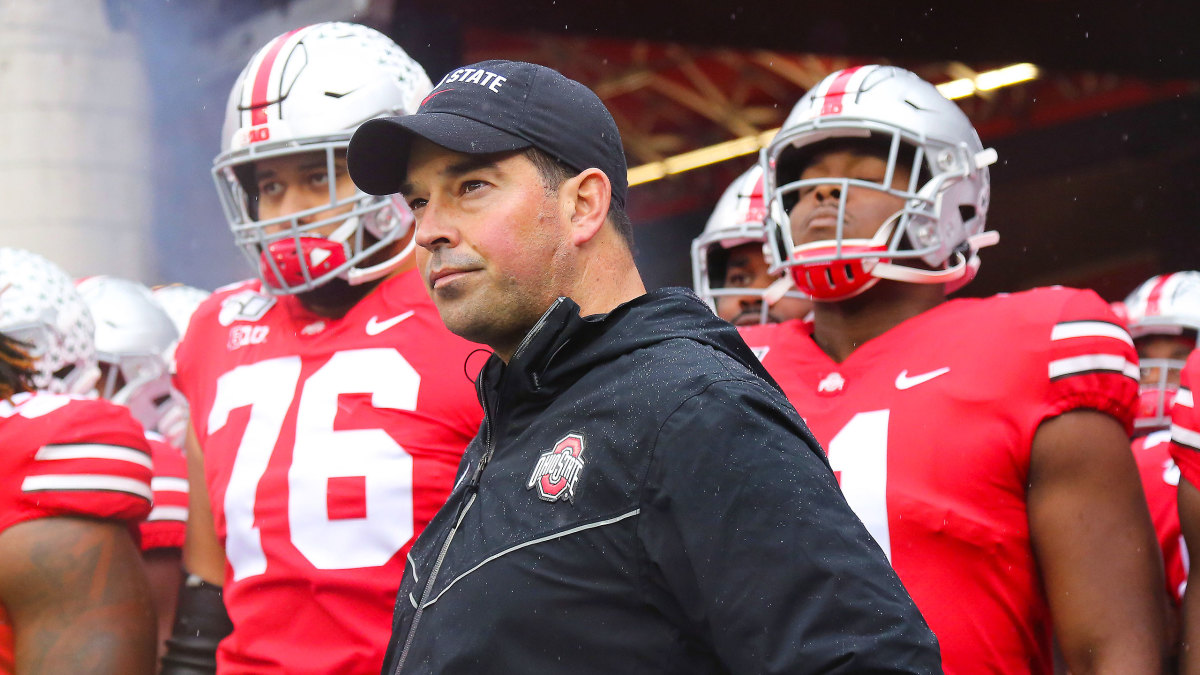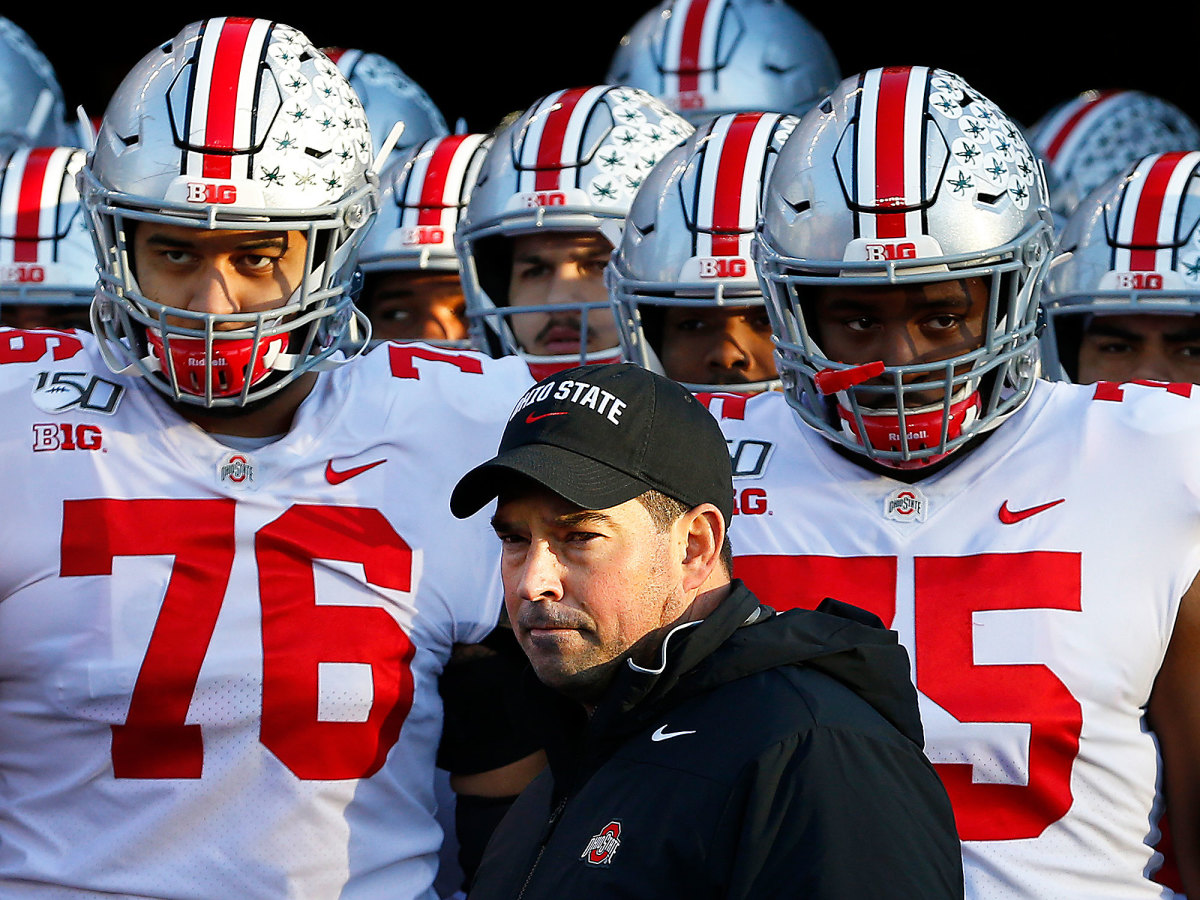Organically and Subtly, Ryan Day Is Making Ohio State Football His Own


COLUMBUS — It’s easy to get distracted before a meeting with Ryan Day. In the waiting room adjacent to his office, there’s a coffee table that doubles as a smart TV. The touch screen gives options to play solitaire, Angry Birds, or watch a movie. To many recruits’ dismay, it’s not Fortnite compatible.
Day had his office and entryway refurbished when he became Ohio State’s new head coach in January following Urban Meyer’s post-Rose Bowl retirement. He changed the old-school office vibe that was last designed by Jim Tressel—which, as the story goes, looked a lot like his living room growing up—from blonde wood paneling and shelving to a new-school vibe that’s more modern and classic: dark wood, comfy brown leather couches, a sleek electric fireplace and of course, the millennial and Gen Z-friendly coffee table.
Despite these renovations, Day insists Ohio State has gone largely unchanged since the Meyer days. From the outside, that seems true. The culture and infrastructure are still in place and the Buckeyes are still one of the best football teams in the country. As they prepare to host No. 8 Penn State on Saturday, OSU sits at 10-0 and No. 2 in the most recent College Football Playoff rankings. It's on track to win the Big Ten. Its 2020 and ’21 recruiting classes have top-five ratings.
And why would the 40-year-old Day want to change anything about a program that went 83–9 in seven seasons under Meyer, including a national championship, anyway? The Buckeyes’ former offensive coordinator is not trying to shake up the place.
In his short tenure as head coach so far, Day has found that people want to label him, find out exactly who he is, and compare him to legendary predecessors like Meyer, Tressel and Earl Bruce. “People want to put us in a box,” Day says. “But you can’t.” He gets frustrated because he’s not doing anything drastically different or trying to be unique, he’s just being true to himself. For example, he still runs the Power play, a traditional yet effective run play that all three of those former coaches used during their respective careers at Ohio State.
“It’s being efficient as opposed to how are you making yourself different,” Day says. “I think a lot of that has to do with how secure you are as a leader. People want to know, ‘What’s different? What’s different? What’s different?’ And then all of the sudden, maybe you start taking on a personality that isn’t yourself because you’re trying to prove yourself and then you’re not secure in your own skin.
“For me, this is who we are. We have a culture. We work at it very hard. And we’re efficient at it.”
Day was relatively unknown in the college football world before he was named interim head coach last fall when Meyer was placed on leave while the university investigated whether he knew about domestic violence allegations against former assistant Zach Smith. The Buckeyes went 3-0 without Meyer and Day was later named his successor, causing a flood of ‘Who is Ryan Day?’ headlines. Before arriving in Columbus, Day spent two seasons in the NFL coaching quarterbacks for Chip Kelly in Philadelphia and San Francisco. His career has spanned from his alma mater New Hampshire (where he played quarterback for then-offensive coordinator Kelly, now his mentor), to a graduate assistant at Florida where he met Meyer, to assistant jobs at Boston College and Temple.
Now, even if it’s been by accident, he is making his mark here. Because there is something different about Ohio State these days. It’s not necessarily the tangible elements—Day made some new hires, including co-defensive coordinators Greg Mattison and Jeff Hafley, and added passing game coordinator Mike Yurcich; he also snagged high-profile quarterback Justin Fields from the transfer portal. But hang around the Woody Hayes Athletic Center for a little while and it becomes evident. Players are looser and bouncier on the sideline before games. They’re not as high strung or stressed out on a day-to-day basis. Everything was always “fourth-and-1” under Meyer, says senior defensive lineman Rob Landers. It’s not that way anymore.
“He has a similar intensity [to Meyer], but his personality and his aura are more laid back and chill,” Landers says. “You can see how Coach Day has taken attributes he’s learned and implemented those and is intertwining them with who he is. They’re completely different people, but their mentality and mindset are the same.”

Not many football coaches can be described as laid back or chill. While Day has the same expectations as Meyer—a strong work ethic, discipline, striving for excellence, etc.—he approaches them in different ways. While both coaches are all about toughness, Day focuses on tough love. While both coaches are fiery, Day has a cooler temperament.
“He’s calm, but intense, demanding, but personable,” says Mickey Marotti, who oversaw Meyer’s strength and conditioning programs at Florida and Ohio State, and has formed a tight bond with Day. “Coach Meyer was probably more of an old-school approach and Ryan is probably a little more new-school approach. The times are different. It’s hard to describe.”
One thing that gets brought up a lot is the fact that Day runs this show with Meyer’s presence still looming. (One day this storyline will fade, but we haven’t reached that moment yet.) When Meyer stepped away, he got a new office in the Fawcett Center, an administrative building that’s across the street from his old one at the Woody Hayes Athletic Center. Never once, or as Day puts it, “not even a little bit,” has he felt the need to adjust his approach and be just like Meyer.
“The only thing you worry about is how successful coach was and following that up,” Day says. “You’re following a legend, one of the best coaches to ever coach. So, what does that look like? How can you out-do that? You can’t. You can’t worry about that.”
Day’s office restoration wasn’t just about style. He wanted a place where players felt comfortable popping by to hang out rather than sneaking past on their way to and from the locker room, which is right next door. While Fields and Landers joke they don’t actually come in that often, they appreciate the standing offer.
“I’ve seen different programs, taken lots of visits and you don’t get a lot of that,” Fields says. “Some programs are more like the NFL. This program is one big family. Coach will be straight up with you and tell you what to improve on. They care about football, but also about your life and future.”
That’s evident when you hear Day say this: “This generation, they want to have something to grab onto, they want to know why, they want to be invested in what’s going on. I think it’s important for these guys to know we love them and care about them and at the end of the day, that’s going to motivate them to want to lead, play harder, and all the things we ask them to do. Which is a lot.”
Day’s goals happen to be the same as Meyer’s, because why wouldn’t he want to win multiple national championships? While he’s not actively trying to be different, by being himself, he just is.
